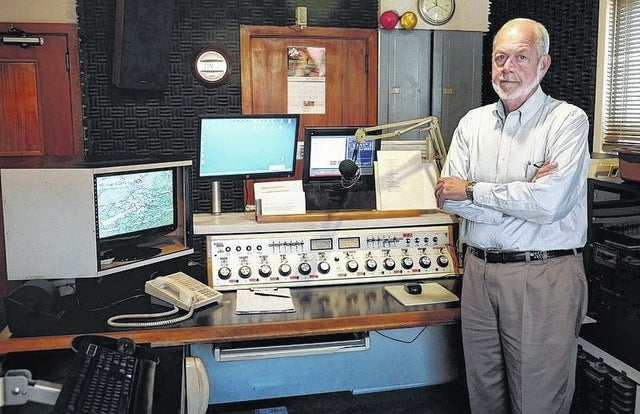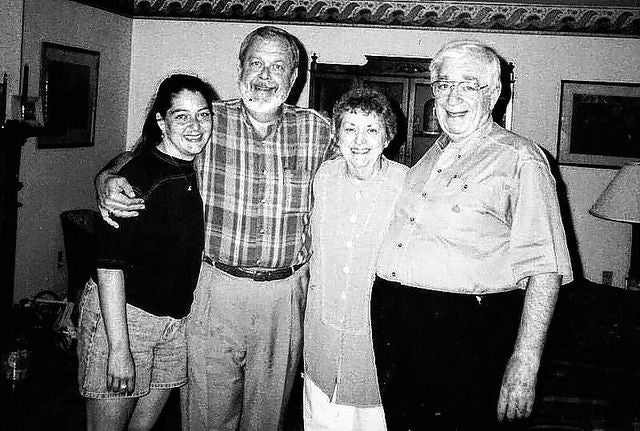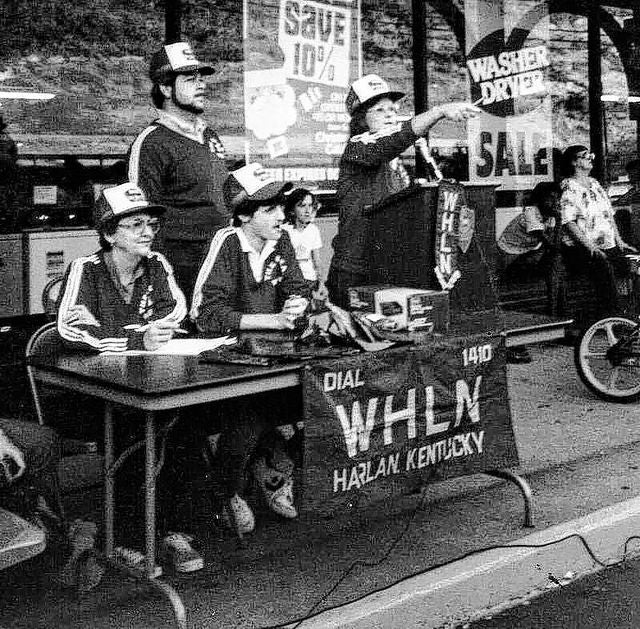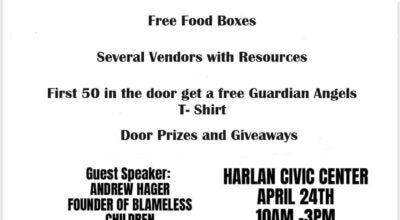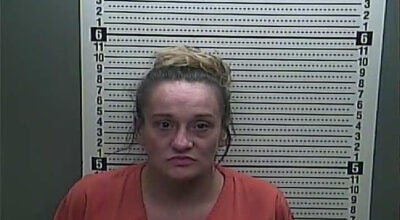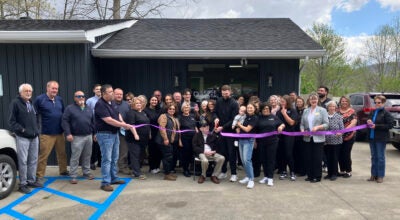Raised on radio: Morgan has seen highs, lows of industry in 50-year career
Published 4:30 pm Friday, December 20, 2019
|
Getting your Trinity Audio player ready...
|
(Editor’s note: Jim Morgan is officially retiring Friday. This story originally ran in the Enterprise in August of 2015. WHLN was recently purchased by Eastern Broadcasting, which also owns WTUK and WFSR in Harlan)
Barely a teenager when his radio career began, Jim Morgan has spent a half century on the airwaves at WHLN Radio.
The son of a radio legend, Morgan soon carved out his own niche in county radio history. From janitor to disc jockey, then program director to general manager, Morgan learned the radio industry from the ground up and used that knowledge to help WHLN thrive for decades.
A massive plaque in the main hallway at the WHLN studios provides a reminder of the biggest moment in the station’s history, the coverage of the devastating 1977 flood that earned the station the prestigious George Peabody Award in 1978. Morgan worked side by side with his father, James T. “Big Jim” Morgan, and other WHLN employees to provide vital information to county residents, many in need of help.
“We made a submission, including the tapes, for judication and won first place for hard news,” Morgan said. “We went to New York to receive the award. My dad and I went up there and met the other recipients. It was a lifetime experience for me. We were the only radio station to win for hard news that year, the only station in the state that had one until WHAS won one for busing.”
Covering the flood was a non-stop job in the hours after the rain commenced, a dose of reality radio in a time of disaster for many.
“That was the most difficult work I’ve done in my career, the destruction and loss of life,” Morgan said. “We left our studios on Cumberland Avenue late that afternoon and went to Fuller’s, where we still had a remote location, and we broadcast until we ran out of fuel and the generator was shutting down. Michael Bryant, who was our news director at the time, and my dad and myself talked non-stop. There were no commercials. It was simply us delivering information about shelters, river stages, plus we had Homer Nolan (local weather observer) and Everett Jones (DES director). We did whatever it took to get it done. I’d talk two or three hours, then Michael Bryant would do the same, then I would go again. Dad was interviewing people on the telephone.
“We had enough presence of mind to make tapes of that. We had to leave when the bottom part of our studio was flooded. The Harlan County Rescue Squad came and got us in boats and we rode them to the corner of Main and Central streets and then we walked to First Street to Fuller’s to do the remotes.”
Floods were a fairly common event in those days.
“My dad had experienced the 1963 flood when we were in the original studios on South Main Street,” Morgan said. “My dad was with my sister and I, and my mom ran the operation.”
“Big Jim” Morgan, who worked with University of Kentucky radio legend Cawood Ledford at WHLN in the early days of the station, was well known statewide for his ability to cover big news events, which meant the younger Morgan learned from one of the best.
Longtime Kentucky Associated Press bureau chief Ed Staats described the station’s work as “radio news at its best” in a statement about the Morgans and WHLN.
“Big Jim and the Morgan family all worked decades to serve their many listeners in Harlan and the surrounding area,” Staats said. “The highlight was winning the George Peabody Award for coverage of the 1977 flood, but what really made WHLN and the Morgan family stand out was their constant coverage of important news developments from their region day in and day out for a half century. Throughout all those years, the station’s personnel made sure their news was shared via The Associated Press with thousands of other broadcast stations and newspapers in this country, and occasionally abroad when the news was of major significance.”
By the time Morgan came to WHLN at 13 as a janitor, his father was already established as a Harlan County icon. The senior Morgan had started at the station in 1946, only five years after WHLN went on the air in May of 1941.
“Back then everybody had to pass an exam to be able to be an announcer,” Morgan said. “You had to have at third class radio operator’s license with a broadcast endorsement. I failed it the first time. Dad went with me the second time and grilled me the night before.”
Morgan’s first board shift was on May 28, 1964, when he was a freshman at Loyall High School.
“I worked afternoon drive, as soon as I got off school until sunset,” said Morgan as he reflected back on that era and the music he played. It was perfect. I liked the Motown groups, the Beatles, of course, and the Beach Boys.”
In the days before satellite radio, WHLN played a variety of musical styles, all in the space of one day.
“When I started out we had block programming,” Morgan said. “From 6 to 10 was country western music. From 10 to noon was easy listening, which was big band stuff then. From noon to 3 we were back to country. From 3 out, it was rock.”
After graduating from James A. Cawood High School in 1967, the first year of the school, Morgan went to work full time at WHLN.
“I went to college for about six weeks and couldn’t stand it,” Morgan said. “I went in and told my dad I was wasting his money and my time.”
Morgan then enrolled in electronics classes at the Harlan Vocational School.
“Bill Simms was our instructor, and he taught me a lot of things I continue to use in my profession,” he said.
The radio industry was also much different in those days as far as what was allowed on the air.
“In the 1960s, everything was very formal in broadcasting,” he said. “You had to be very careful in what you said. Nothing was funny. The 70s came along and everything started to loosen up.”
Morgan’s on-air name through the 1960s and 1970s, except on news programming, was Dudley Du-Rite, a name he picked up as a member of the Loyall band.
“My father’s moniker on the Birthday Club was Uncle Fudd. I don’t know the story behind that, but I remember him using that name,” he said. “The older guys in the band started calling me Uncle Dud, so it started from there.”
While still working as an on-air personality, Morgan moved over to sales. His days started early, arriving at work at 4 a.m. to be ready to go on the air at 6.
“We didn’t pre-record news or anything at that time,” Morgan said. “I did that for 13 years, six days a week, from 1972 to 1985.”
Even though they worked together for over 40 years, before the elder Morgan’s death in 2009, the father and son duo rarely had disagreements.
“My dad fired me one time,” Morgan remembered with a laugh. “We had an argument at home, probably in the late 1960s. He told me I was fired. I told him you can’t fire me, I quit. I went to bed that night and he got me up at 4 and asked if I was going to work.
“I said ‘I thought you fired me.’ He said ‘I thought you quit.’”
WHLN switched to an adult contemporary format in the 1970s, about the same time the station started airing “American Top 40” with Casey Kasem.
“We had a nice long run with that,” Morgan said.
But before the show could air in Harlan, Morgan had to convince his father it was a good move for the station.
“We had a lot of programming scheduled on Sunday. I went in and asked him if I could sell this new programming would he make room for it. That was on Monday, and by Tuesday morning I had sold it out,” Morgan said. “I think that was the first time he really respected my opinion. This was the 1970s, and I felt people were ready for a change.”
Perhaps the most popular program of that era was the Birthday Club, sponsored by and held at Fuller’s Furniture
“My first trip to the Birthday Club, I was 5 years old and my dad was doing it,” Morgan said.
Morgan eventually settled into a leading role on the program, which featured a mixture of music and birthday announcements, along with plenty of humor.
“We did our live remote from there six days a week, at 10:30,” he said. “The best rapport I ever had with anyone was with ‘True Doug’ Stallard back at the studio. We had a very similar sense of humor and we instinctively knew how the other would react to what was said. That was an enjoyable part of my career with Doug.”
Stallard, who worked at WHLN from 1970 to 1977, is now vice president of engineering with Channel 8 in Knoxville.
The station continued to thrive into the 1980s even as Morgan’s role changed.
“It became more management and sales,” said Morgan of his move to general manager in the mid 1980s. “That was probably our best time (financially) in the history of the company. We had 16 people on staff in the mid 1980s. It was a good time. We had some very talented people. Dan and Robb Lee were two of the most creative announcers we’ve had. Neil Middleton (now at WYMT) was also here for a short time.”
Robb Lee, who now lives in Louisville, is grateful for the opportunity to work at WHLN, beginning when he was a Harlan High School student. Lee went on to work in radio in Richmond while a student at Eastern Kentucky University and also served for several years as the public address announcer for EKU sporting events.
“Jim is a true public servant in every sense of the word. He’s the greatest broadcaster I’ve ever worked for,” Lee said. “He was a person who gave his life to Harlan County and serving our region.”
Middleton moved into television soon after leaving WHLN but remembers his time there fondly.
“I remember listening to Jim Morgan ‘Dudley Du-Right’ from my earliest days. That’s where my interest in broadcasting first began. Listening to him play songs, the Birthday Club from Fuller’s Furniture and news updates were part of my everyday life from a child to a young adult,” Middleton said. “Like his father, “Big Jim”, his booming voice commanded your attention and calmed your fears during times of disaster. I was honored to later work with Jim at WHLN. Jim and his family played a major role in my development as a professional broadcaster. I consider him my mentor and friend.”
The next change for WHLN was when it went completely automated in 2003 after a gradual transition through the 1990s.
“It got to the point where the economies of production sort of forced us into doing what we are doing,” Morgan said. “It was probably a good thing we did it, because there were some lean times since then. You don’t have to train people or program the station.”
Morgan says Shaun Burnett, the operations manager, and Kyle Burnett took on an even bigger role at the station after Morgan’s father died.
Morgan’s wife, Marybelle, worked at the station from 1990 to approximately 2007.
“Marybelle was the most successful sales representative we ever had,” Morgan said. “Our style has always been based on relationships, how we can help clients make money.”
Making money in radio has been difficult of late with the local economy struggling due to the decline of the coal industry, and Morgan knows the end could be near, both for his radio career and for the station.
“The biggest thing that changed since the late 1990s is that locally owned businesses have been on the decline,” Morgan said. “That was always the bread and butter of what we did. We lost a lot of local direct business. There was no line of succession in a lot of businesses, and that’s pretty much where I’m at right now. I have three children (two in Kentucky and one in Florida), and they all have their own lives. They have all been successful.”
“We’re struggling like everybody due to the loss of coal mining jobs. We have been attempting to sell the station since 2008. If we are unable to find a buyer, we will have to close.”
But despite the problems of recent years, Morgan has no regrets about spending his life in his hometown at the only job he has ever known.
“My dad was asked once why he didn’t go elsewhere, and he was offered numerous jobs, and I was offered a few myself, and the answer to that is our commitment to the community,” Morgan said. “We’ve always been committed to doing our best to help our community and protect it in times of trouble.
“That was his answer and it’s my answer. I have lived in Harlan all my life, and will continue to until I can’t. It’s nice to live in a place where people know you by your first name and it takes you 30 minutes to walk to the post office.”


